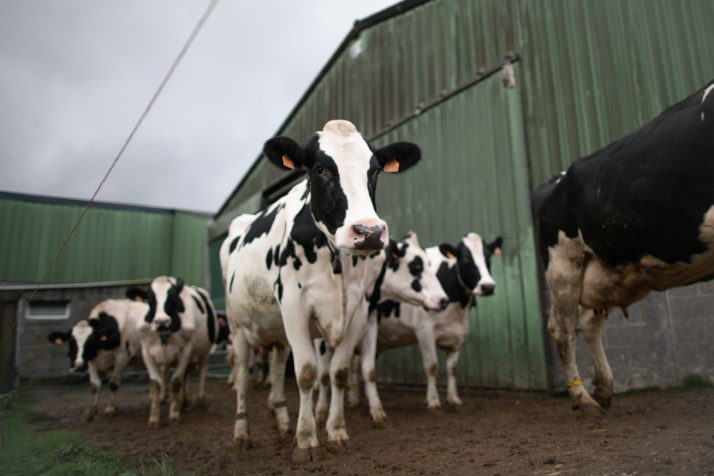
This week students that receive school lunches will receive a serving a yogurt thanks to the donation. The group also purchased 100 “Support Dairy” signs to distribute free of charge throughout the community. Costello said the demand was do great that they had another 200 signs printed within 12 hours!
In addition, the FFA is also working with a local dairy producer interested in donating 1,000 gallons of milk to be distributed via a 1,000 gallon Dairy Drive Thru for the Waupun Area School District.
WASHINGTON D.C.
FDA stymies ethanol hand sanitizer guidelines
The Food and Drug Administration has delivered the latest blow to ethanol demand.
Renewable Fuels Association CEO Geoff Cooper told Brownfield Ag News that the industry had been working with the FDA to develop some clear rules so ethanol producers could begin producing alcohol for hand sanitizer.
Last week the FDA dished out new guidance to the industry and added confusion to what is and isn’t allowed in terms of alcohol used for hand sanitizer, Cooper said.
The FDA’s updated guidelines say “because of the potential for the presence of potentially harmful impurities due to the processing approach, fuel or technical grade ethanol should only be used if it meets The United States Pharmacopeia or Food Chemicals Codex grade requirements.”
Cooper tells Brownfield that contradicts FDA guidance from March 27th that prompted more than two dozen ethanol plants to invest in hand sanitizer production.
“They have stepped forward in the last few weeks, produced and shipped millions of gallons of high-grade alcohol for hand sanitizer use (and) they’ve got contracts for more. So we just need FDA to take the red tape and just kind of get out of the way.”
WORTHINGTON, MN
JBS shutters Minnesota pork processing plant
Another pork processing plant has announced an indefinite shutdown, putting even more pressure on the supply chain. Bob Krebs, president of JBS USA Pork says the company plans to shutter its Worthington, Minnesota facility this week as they’re finding the virus is much more widespread across the US and in their county. He says the decision wasn’t made lightly and over the next two days the facility will wind down operations with a reduced staff to ensure existing product in the facility can be used to support the food supply.
The company says it will advise its employees to follow Minnesota governor Tim Walz’s stay at home order until returning to work. JBS says employees will continue to receive pay during the plant closure.
The JBS Greeley, Colorado beef production facility also remains closed, while the company’s beef production facility in Souderton, Pennsylvania reopened today.
The Worthington, Minnesota pork facility employs more than 2,000 people and processes around 20,000 hogs per day.
KANSAS CITY, KS
Dairy Farmers Of America donate dairy products to families in need
At a time when many Americans are facing unprecedented hardships as a result of the COVID-19 outbreak, the family farm-owners and employees of Dairy Farmers of America (DFA), a national dairy cooperative, are stepping up to provide nutritious dairy products to those in need.
In addition to hosting events such as drive-by milk giveaways at schools and donating fluid milk directly to food banks, DFA announced on April 20, the launch of its Farmers Feeding Families Fund, which hopes to raise $500,000 for community food banks across the country. Initial seed money of $200,000 has already been raised through the Cooperative’s DFA Cares Foundation, PRNewswire reported.
“As dairy farmers, we are proud of the role we play in feeding families, and in times like these when so many are struggling, we feel passionately about doing all we can to help,” said Randy Mooney, a dairy farmer from Rogersville, Mo., and chairman of DFA’s Board of Directors. “Food banks are always in need of dairy products, which are less commonly donated because of how perishable they are. Initiatives like this that allow us to get our highly nutritious milk and dairy products into the hands of people who need them are essential right now. I’m proud to be a part of it.”
As demand for food assistance rises with the COVID-19 outbreak, Feeding America, with its more than 200 affiliates across the country, has projected a $1.4 billion shortfall in the next six months alone.
DFA has identified 30 communities across the country whose local food banks will receive funds to purchase much-needed dairy products. In addition, DFA farmer-owners are being asked to help identify additional rural communities in need of dairy products for distribution.
“Hunger is a critical, ongoing need throughout America,” said Jackie Klippenstein, senior vice president of government, industry and community relations. “In times of crisis, that need is even greater. Even in times of uncertainty and increasing challenges, our farm families and employees remain steadfast in their commitment to making an impact in the communities where we live and work.”
Beyond the monetary donation to food banks, DFA is also working with industry leaders and milk processors across the country to come up with solutions and uses for surplus milk due to declines in foodservice demand as a result of COVID-19. A few examples include:
Donating more than 9,500 half gallons of milk to Connecticut Food Bank in conjunction with DFA-owned Guida’s Dairy.
Partnering with Daisy® Brand to donate 120,000 pounds of cottage cheese over a six-week period to the Akron-Canton Regional Foodbank, the Greater Cleveland Food Bank and other local food banks throughout Ohio.
Working with the American Dairy Association North East and local Dean Foods plants in New York and Pennsylvania to provide more than 36,000 half gallon jugs of milk to City Harvest in Brooklyn, N.Y., Share Food Program in Philadelphia, Pa., and Rolling Harvest in Highstown, N.J., and more than 4,000 gallon jugs to Corinth Central School District in Corinth, N.Y.
Coordinating with Dean Foods plants in Texas to donate milk to local food banks in the area.
WASHINGTON D.C.
USDA delays enforcement of COOL laws
Starting on April 20, the U.S. Department of Agriculture is easing country-of-origin requirements to allow fresh produce that has been packed for food service operators to be diverted to retailers as demand shifts during the pandemic.
According to a news release, USDA’s AMS is “exercising enforcement discretion” for COOL requirements, which cover fresh and frozen produce, meat, fish and some nuts. The COOL regulations don’t cover items packed for the food service channel, but with heightened demand because dine-in food service isn’t available, many food service operators are looking for new outlets.
The measure is expected to be in force for 60 days, unless the produce makes country of origin or method of production claims, according to a news release.
The Food and Drug Administration and USDA’s Food Safety and Inspection Service, which covers meat and related COOL enforcement, have already made similar changes, according to the release.
TERRE HAUTE, IN
Indiana farmers get ready to plant amid lower grain prices
Wabash Valley farmers are beginning to prepare fields for planting despite facing a downturn as grain prices fall amid the coronavirus pandemic.
The start of the planting season looks much better than last year’s wet spring. But Vigo County farmer Frank Strain said corn prices per bushel have tumbled from earlier months.
New crop corn prices at Terre Haute Grain last week were $3.25 per bushel and soybeans were at $8.41 per bushel, the Tribune-Star reported.
“From an economic outlook, it doesn’t look good,” said Brad Burbrink, an owner of Be-N-Ag Family Farm.
But he acknowledged that soil conditions are good for planting, even if demand for corn and soybeans have hurt bushel prices.
The U.S. Department of Agriculture’s 2020 prospective plantings survey indicates farmers nationwide intend to plant 97 million acres of corn, 83.5 million acres of soybeans and 44.7 million acres of wheat.
The coronavirus relief law passed by Congress at the end of March set aside $23.5 billion for agriculture, including $9.5 billion specifically for specialty crop and local producers. But Wabash Valley farmers are still unsure how those federal funds will be dispersed.

























